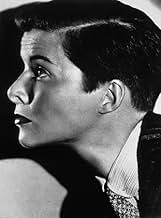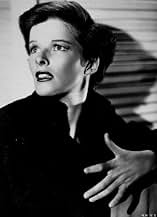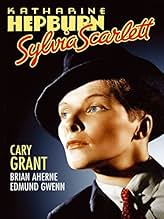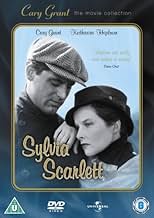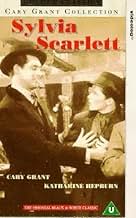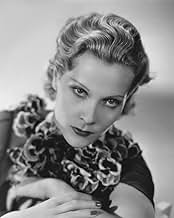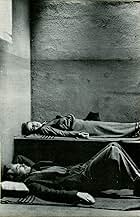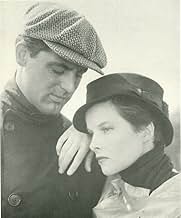IMDb RATING
6.2/10
4.8K
YOUR RATING
When her father decides to flee to England, young Sylvia Scarlett must become Sylvester Scarlett and protect her father every step of the way, with the questionable help of plenty others.When her father decides to flee to England, young Sylvia Scarlett must become Sylvester Scarlett and protect her father every step of the way, with the questionable help of plenty others.When her father decides to flee to England, young Sylvia Scarlett must become Sylvester Scarlett and protect her father every step of the way, with the questionable help of plenty others.
- Awards
- 1 win total
Robert Adair
- Turnkey
- (uncredited)
Bunny Beatty
- Maid
- (uncredited)
May Beatty
- Older Woman on Ship
- (uncredited)
Daisy Belmore
- Fat Woman on Beach
- (uncredited)
Carmen Beretta
- Woman
- (uncredited)
Nina Borget
- Minor Role
- (uncredited)
Thomas Braidon
- Minor Role
- (uncredited)
Elsa Buchanan
- Minor Role
- (uncredited)
Colin Campbell
- Minor Role
- (uncredited)
James Carlisle
- Park Scam Onlooker
- (uncredited)
Patricia Caron
- Minor Role
- (uncredited)
Harold Cheevers
- Bobby
- (uncredited)
E.E. Clive
- Customs Inspector
- (uncredited)
Edward Cooper
- Customs Inspector
- (uncredited)
Featured reviews
An extremely unusual little film from director George Cukor makes the odd transition from caper comedy to coming of age romance - and occasionally teeters back and forth between the two. The film was a massive flop at the box office (in order to make amends for the film's failure, Cukor and star Katharine Hepburn reportedly offered to make their next film for free), and the audiences of thirties just didn't seem to understand film's bizarre juxtaposition between gritty depression-era realism and dreamy Hollywood surrealism. In all truth, however, the film is enormously entertaining when viewed today, and its unusual tone will be better appreciated by modern audiences.
Although this is the performance that led her to be labeled by critics and theater owners as "box office poison," Hepburn is delightful in role that was quite offbeat for the time (this was 48 years before Barbra Streisand donned male drag in YENTL). Brian Aherne also delivers an endearingly off-kilter performance as Sylvia's love interest, and Edmund Gwenn is terrific in the difficult role of Sylvia's father, who must balance humor and pathos at regular intervals. Best of all is Cary Grant who flat-out nails his role as a cockney con man, and simply radiates with wit, sex appeal, and macho charisma. He alone would make the film worth watching, but, on the whole, SYLVIA SCARLETT remains a lost gem that was very much ahead of its time.
Although this is the performance that led her to be labeled by critics and theater owners as "box office poison," Hepburn is delightful in role that was quite offbeat for the time (this was 48 years before Barbra Streisand donned male drag in YENTL). Brian Aherne also delivers an endearingly off-kilter performance as Sylvia's love interest, and Edmund Gwenn is terrific in the difficult role of Sylvia's father, who must balance humor and pathos at regular intervals. Best of all is Cary Grant who flat-out nails his role as a cockney con man, and simply radiates with wit, sex appeal, and macho charisma. He alone would make the film worth watching, but, on the whole, SYLVIA SCARLETT remains a lost gem that was very much ahead of its time.
Not a great movie, or even a very successful one in conventional terms, but quite fascinating to watch. A lot of people are put off by the semi-deliberate artificiality of the acting and the fanciful nature of the story, at least up to the moment where Hepburn reveals herself as a woman to Aherne.
But I think this is the point. Cukor (and Hepburn) were striving for something a bit like A Midsummer Night's Dream (which Hollywood was filming around the same time). A bunch of con-artist misfits meet up and then find a spot for themselves as a sort of traveling commedia dell-arte stage act. They fetch up in an artists' colony in Cornwall, where they are presumably more accepted than elsewhere. A kind of 1930s Forest of Arden.
There, Sylvia's masquerade is not scandalous but amusing. And just as there's actual enchantment in Shakespeare's play, the manner in which Hepburn is revealed as a woman to Aherne (an artist, of course) suggests that on some level she wasn't just masquerading. She literally is transformed back from a boy to a girl, who has to be taught once again what a girl (they never say woman in the movie) behaves like. Instead of appearing threatening to conventional notions of gender, the film underlines Sylvia/Sylvester's vulnerability and innocence.
The gay angle is clear: The theater, and the world of artists, is where Hepburn and her companions (impecunious, emotionally unstable father; odd, flighty servant girl; amoral con artist) are accepted and not judged, where her masquerade isn't a crime but an artistic achievement. Sylvia Scarlett is an effort to make American audiences embrace and find the charm in ways of life it officially rejected.
The whole concept is pretty stagy, but of course Cukor and Hepburn both came from the theater.
But while it all must have looked doable good on paper, it doesn't really work on screen. The script undermines it, for one thing: the plot is full of holes and soon after the big scene with Aherne, the enchantment and strangeness start to drain out of the story, which turns into conventional girl-meets-boy. The only remaining question is whether Kate will find up with Cary or Brian, and that just doesn't hold much interest.
One reason for this is Cukor. He was a fine director of actors, and with a good script he could make a marvelous picture. But he wasn't a great visual artist, like Ford or Welles or Hawks, who could often take mediocre writing and make it sing on screen. This is the highest-concept film he ever made, except possibly Justine late in his career, and he doesn't really have the knack for it. The broad playing and semi-Shakespearean humor never really work the way they should, and Cukor can't seem to make Sylvia's father, the darker character in the whole thing, mesh with the rest.
I wonder if the story wouldn't have been more at home in the silent cinema, where there was more latitude for enchantment and masquerade and make-believe? How would FW Murnau (Sunrise) have handled this material, for example? Hepburn herself is at her best and most entertaining in her scenes as Sylvester. She's acrobatic and rambunctious and fun to watch. The other characters treat her as a sort of adorable boy, kind of like Cherubino in The Marriage of Figaro. Very much in keeping with the deliberately theatrical atmosphere the movie tries for. Once Hepburn puts on a dress again, however, she tends to subside into that familiar Hepburn wonderfulness that can be annoying in some of her other films. The rest of the cast is just fine.
Could this have been a better movie? David Thomson suggests that another director and star (Hawks and Stanwyck, perhaps) could have made it work. Perhaps - but it would have been more conventional. I doubt that anyone else would have opted for the enchanted-forest, Midsummer Night's Dream approach that makes it so interesting. Again, I think it would have had a better chance in the silent era.
Too bad, however, that someone didn't try again!
But I think this is the point. Cukor (and Hepburn) were striving for something a bit like A Midsummer Night's Dream (which Hollywood was filming around the same time). A bunch of con-artist misfits meet up and then find a spot for themselves as a sort of traveling commedia dell-arte stage act. They fetch up in an artists' colony in Cornwall, where they are presumably more accepted than elsewhere. A kind of 1930s Forest of Arden.
There, Sylvia's masquerade is not scandalous but amusing. And just as there's actual enchantment in Shakespeare's play, the manner in which Hepburn is revealed as a woman to Aherne (an artist, of course) suggests that on some level she wasn't just masquerading. She literally is transformed back from a boy to a girl, who has to be taught once again what a girl (they never say woman in the movie) behaves like. Instead of appearing threatening to conventional notions of gender, the film underlines Sylvia/Sylvester's vulnerability and innocence.
The gay angle is clear: The theater, and the world of artists, is where Hepburn and her companions (impecunious, emotionally unstable father; odd, flighty servant girl; amoral con artist) are accepted and not judged, where her masquerade isn't a crime but an artistic achievement. Sylvia Scarlett is an effort to make American audiences embrace and find the charm in ways of life it officially rejected.
The whole concept is pretty stagy, but of course Cukor and Hepburn both came from the theater.
But while it all must have looked doable good on paper, it doesn't really work on screen. The script undermines it, for one thing: the plot is full of holes and soon after the big scene with Aherne, the enchantment and strangeness start to drain out of the story, which turns into conventional girl-meets-boy. The only remaining question is whether Kate will find up with Cary or Brian, and that just doesn't hold much interest.
One reason for this is Cukor. He was a fine director of actors, and with a good script he could make a marvelous picture. But he wasn't a great visual artist, like Ford or Welles or Hawks, who could often take mediocre writing and make it sing on screen. This is the highest-concept film he ever made, except possibly Justine late in his career, and he doesn't really have the knack for it. The broad playing and semi-Shakespearean humor never really work the way they should, and Cukor can't seem to make Sylvia's father, the darker character in the whole thing, mesh with the rest.
I wonder if the story wouldn't have been more at home in the silent cinema, where there was more latitude for enchantment and masquerade and make-believe? How would FW Murnau (Sunrise) have handled this material, for example? Hepburn herself is at her best and most entertaining in her scenes as Sylvester. She's acrobatic and rambunctious and fun to watch. The other characters treat her as a sort of adorable boy, kind of like Cherubino in The Marriage of Figaro. Very much in keeping with the deliberately theatrical atmosphere the movie tries for. Once Hepburn puts on a dress again, however, she tends to subside into that familiar Hepburn wonderfulness that can be annoying in some of her other films. The rest of the cast is just fine.
Could this have been a better movie? David Thomson suggests that another director and star (Hawks and Stanwyck, perhaps) could have made it work. Perhaps - but it would have been more conventional. I doubt that anyone else would have opted for the enchanted-forest, Midsummer Night's Dream approach that makes it so interesting. Again, I think it would have had a better chance in the silent era.
Too bad, however, that someone didn't try again!
SYLVIA SCARLETT (RKO Radio, 1935/released early January 1936), directed by George Cukor, and starring Katharine Hepburn, Cary Grant and Brian Aherne, is a movie that was somewhat ahead of its time. In the early 1970s during the so-called "nostalgia boom" era, I kept hearing about this being the worst Katharine Hepburn movie ever made. Because of that reputation, I became curious. Could it really be that bad? In a TV documentary about classic movies I saw many years ago, Hepburn was interviewed and said the majority of the theater patrons walked out long before the movie was over. Today it has gained a reputation as a "camp classic." Well, I finally got to watch this curious item for the first time on public television's WNET, Channel 13, in New York City in 1977 as part of the Katharine Hepburn Film Festival, which aired every Saturday night. After watching it, I kept wondering if this was supposed to be a comedy or drama. I guess a combination of both.
As for the plot, which opens in Paris, Henry Scarlett (Edmund Gwenn) commits larceny and takes off aboard ship with his daughter, Sylvia (Hepburn). To put the authorities off the track, she decides to cut her long hair and accompany him disguised as Scarlett's son, "Sylvester." They later meet up with a fast-talking swindler named Jimmy Monkley (Cary Grant) and travel with him around England like gypsies, making some easy money by cheating the public. Later, Sylvia, still disguised as Sylvester, encounters Michael Fane (Brian Aherne), an artist, and becomes interested in him, to later abandon her disguise to win him over.
Of the entire cast, Cary Grant comes off best in a very offbeat role, cockney accent and all, thus stealing every scene he's in. He even gets the closing shot sitting in a train compartment laughing himself silly after looking out the window and seeing Sylvia running off with Michael. Also in the cast are Natalie Paley as Lily, a Russian adventuress who tries to nab Henry Scarlett for herself, causing tragedy for him; and Dennie Moore as a daffy servant girl.
In spite of its reputation, SYLVIA SCARLETT is more interesting to see today because of the premise of a woman masquerading as a man/boy which pre-dates the more recent, VICTOR/VICTORIA (1982) with Julie Andrews. But let's not forget the 1933 MGM drama, QUEEN Christina in which Greta Garbo's character is mistaken for a young lad by an ambassador from Spain (John Gilbert), but at least that masquerade didn't go on for the entire movie. Unfortunately, Hepburn's version is an idea that might have looked good on paper, but not on screen. She does make a convincing boy, so to speak, in spite of her height, but I wonder how she felt about it years after it was made. A box office bomb at the time of its release, Hepburn and Grant did get to work together in screen again in three more comedies, BRINGING UP BABY (RKO, 1938), HOLIDAY (Columbia, 1938) and THE PHILADELPHIA STORY (MGM, 1940). SYLVIA SCARLETT, which formerly played on American Movie Classics prior to 2000, can be seen on Turner Classic Movies, or as a video/DVD rental. (**1/2)
As for the plot, which opens in Paris, Henry Scarlett (Edmund Gwenn) commits larceny and takes off aboard ship with his daughter, Sylvia (Hepburn). To put the authorities off the track, she decides to cut her long hair and accompany him disguised as Scarlett's son, "Sylvester." They later meet up with a fast-talking swindler named Jimmy Monkley (Cary Grant) and travel with him around England like gypsies, making some easy money by cheating the public. Later, Sylvia, still disguised as Sylvester, encounters Michael Fane (Brian Aherne), an artist, and becomes interested in him, to later abandon her disguise to win him over.
Of the entire cast, Cary Grant comes off best in a very offbeat role, cockney accent and all, thus stealing every scene he's in. He even gets the closing shot sitting in a train compartment laughing himself silly after looking out the window and seeing Sylvia running off with Michael. Also in the cast are Natalie Paley as Lily, a Russian adventuress who tries to nab Henry Scarlett for herself, causing tragedy for him; and Dennie Moore as a daffy servant girl.
In spite of its reputation, SYLVIA SCARLETT is more interesting to see today because of the premise of a woman masquerading as a man/boy which pre-dates the more recent, VICTOR/VICTORIA (1982) with Julie Andrews. But let's not forget the 1933 MGM drama, QUEEN Christina in which Greta Garbo's character is mistaken for a young lad by an ambassador from Spain (John Gilbert), but at least that masquerade didn't go on for the entire movie. Unfortunately, Hepburn's version is an idea that might have looked good on paper, but not on screen. She does make a convincing boy, so to speak, in spite of her height, but I wonder how she felt about it years after it was made. A box office bomb at the time of its release, Hepburn and Grant did get to work together in screen again in three more comedies, BRINGING UP BABY (RKO, 1938), HOLIDAY (Columbia, 1938) and THE PHILADELPHIA STORY (MGM, 1940). SYLVIA SCARLETT, which formerly played on American Movie Classics prior to 2000, can be seen on Turner Classic Movies, or as a video/DVD rental. (**1/2)
Androgeny is a quality that some of the biggest of our great stars possessed: Garbo, Dietrich, Grant, Vanessa Redgrave, to name a few, and of course, Katharine Hepburn. In "Sylvia Scarlett," she plays a young woman masquerading as a young man for part of this rather strange film that can't make up its mind what it is. The movie also stars Cary Grant, Edmund Gwenn and Brian Aherne. Gwenn is Henry Scarlett, an embezzler who has to high-tail it out of England fast. When his daughter Sylvia insists on going along, he tells her everyone will be looking for him with his daughter, so Sylvia becomes Sylvester by cutting his hair and donning mens' clothes.
On the boat, the two meet Jimmy Monckley, a con man, and eventually team up with him for a series of cons. Then a flirtatious maid friend of Jimmy's joins them and they become vaudevillians in one of the film's more bizarre twists. Henry, a widower, marries said maid and winds up obsessive and jealous (with, one suspects, good reason since she makes a pass at Sylvia as Sylvester). One night at a performance, the cast meets an artist, Michael Fane, whom Sylvia falls for, and she ultimately reveals himself to him as a woman.
The plot of this film changes more than the sexes, with Hepburn inexplicably staying a boy once she and her father have made their escape to France. There are some great scenes - the con in the French park, with Sylvia pretending to be a destitute boy who can't speak English, and the scene where the dress she stole on the beach so she could make her big reveal to Michael is recognized by the owner. Also, the act they perform is amusing. It probably would have been better to stick with the con angle and have the script go from there, but it goes from that to the performance angle to a love triangle etc.
Katharine Hepburn makes both an excellent boy and young woman in the throes of first love, and Cary Grant has an early, uncharacteristic role as an absolute thief and heel who is also somewhat abusive. His persona would change, and he would find it difficult to convince anyone later on to let him go back to this type of character who is not redeemed at the end. But his good looks and charm make him a natural rogue. The underrated Brian Aherne, who it appears wound up taking a back seat to Errol Flynn, is marvelous as Michael. He's romantic, sexy, and gives the role a light touch.
Directed by George Cukor, "Sulvia Scarlett" is a dizzy film that's not a wild comedy (which it probably should have been) or a drama or a love story. It's remembered today for Hepburn's cross-dressing. A shame, because it could have been remembered for more than that.
On the boat, the two meet Jimmy Monckley, a con man, and eventually team up with him for a series of cons. Then a flirtatious maid friend of Jimmy's joins them and they become vaudevillians in one of the film's more bizarre twists. Henry, a widower, marries said maid and winds up obsessive and jealous (with, one suspects, good reason since she makes a pass at Sylvia as Sylvester). One night at a performance, the cast meets an artist, Michael Fane, whom Sylvia falls for, and she ultimately reveals himself to him as a woman.
The plot of this film changes more than the sexes, with Hepburn inexplicably staying a boy once she and her father have made their escape to France. There are some great scenes - the con in the French park, with Sylvia pretending to be a destitute boy who can't speak English, and the scene where the dress she stole on the beach so she could make her big reveal to Michael is recognized by the owner. Also, the act they perform is amusing. It probably would have been better to stick with the con angle and have the script go from there, but it goes from that to the performance angle to a love triangle etc.
Katharine Hepburn makes both an excellent boy and young woman in the throes of first love, and Cary Grant has an early, uncharacteristic role as an absolute thief and heel who is also somewhat abusive. His persona would change, and he would find it difficult to convince anyone later on to let him go back to this type of character who is not redeemed at the end. But his good looks and charm make him a natural rogue. The underrated Brian Aherne, who it appears wound up taking a back seat to Errol Flynn, is marvelous as Michael. He's romantic, sexy, and gives the role a light touch.
Directed by George Cukor, "Sulvia Scarlett" is a dizzy film that's not a wild comedy (which it probably should have been) or a drama or a love story. It's remembered today for Hepburn's cross-dressing. A shame, because it could have been remembered for more than that.
There seem to be some very common unfortunate negative feelings about this film ("SS"), which I think are mostly a clash of expectations with execution. The film presents two great stars in unexpected roles with unexpectedly complicated characters and quirky humor.
This is an interesting platform for Hepburn's developing style, moving her from relatively straightforward "strong female" roles (Christopher Strong, The Little Minister 1932-1934) to more multifaceted personas where Hepburn has to interact more with her femininity (Alice Adams, Quality Street 1935-1937). Sylvia's concern with her sexuality is very disconcertingly captured by the alternatingly coquettish and belligerent Hepburn.
Cary Grant's role in SS is a dark type he didn't get to do often enough, but excelled at. Grant has in this movie a truly unredeemable side that can't be whitewashed by just putting on nice clothes or changing his accent--a side he perfected in None But The Lonely Heart.
The movie also has great virtue as a cultural island in rather intolerant times. The faint undertones of male (Sylvester and Michael Fane) and female (Sylvia and Maudie and Lily) homosexuality are subtle and effectively done, and of course the transvestitism is diverting: the scene where Hepburn meets the owner of her dress is a classic.
Overall, the humor and characterizations in SS are pointed in so many directions that it's hard to figure out whether the movie is deep or ditzy. I have my doubts--the change from con-men to vaudevillians would be hilarious if it weren't so bizarre--but I vote for the former. This movie deserves its place beside Bringing Up Baby, Holiday and The Philadelphia Story as an enduring work of the Hepburn/Grant collaboration.
This is an interesting platform for Hepburn's developing style, moving her from relatively straightforward "strong female" roles (Christopher Strong, The Little Minister 1932-1934) to more multifaceted personas where Hepburn has to interact more with her femininity (Alice Adams, Quality Street 1935-1937). Sylvia's concern with her sexuality is very disconcertingly captured by the alternatingly coquettish and belligerent Hepburn.
Cary Grant's role in SS is a dark type he didn't get to do often enough, but excelled at. Grant has in this movie a truly unredeemable side that can't be whitewashed by just putting on nice clothes or changing his accent--a side he perfected in None But The Lonely Heart.
The movie also has great virtue as a cultural island in rather intolerant times. The faint undertones of male (Sylvester and Michael Fane) and female (Sylvia and Maudie and Lily) homosexuality are subtle and effectively done, and of course the transvestitism is diverting: the scene where Hepburn meets the owner of her dress is a classic.
Overall, the humor and characterizations in SS are pointed in so many directions that it's hard to figure out whether the movie is deep or ditzy. I have my doubts--the change from con-men to vaudevillians would be hilarious if it weren't so bizarre--but I vote for the former. This movie deserves its place beside Bringing Up Baby, Holiday and The Philadelphia Story as an enduring work of the Hepburn/Grant collaboration.
Did you know
- TriviaHoward Hughes visited the set one day, landing his amphibious plane near the beach where they were filming. Hughes said he stopped by to say hello to his good friend Cary Grant but in actuality he wanted to meet Katharine Hepburn, with whom he was fascinated. The film The Aviator (2004) recreates this first meeting of theirs.
- GoofsWhen Sylvester yells for a cop outside the mansion, Henry gets left outside. Jimmy opens the door and pulls Henry in roughly. In doing so, Henry loses a shoe. Inside the mansion, Henry has both shoes, never having retrieved his shoe from outside.
- Quotes
Sylvia Scarlett: Well, we're all fools sometimes. Only you choose such awkward times.
- ConnectionsFeatured in The Men Who Made the Movies: George Cukor (1973)
- SoundtracksHello ! Hello ! Who's your Lady Friend ?
(uncredited)
Music by Harry Fragson
Lyrics by Worton David and Bert Lee (1914)
Sung by Cary Grant and Edmund Gwenn
- How long is Sylvia Scarlett?Powered by Alexa
Details
Box office
- Budget
- $641,000 (estimated)
- Runtime
- 1h 35m(95 min)
- Color
- Aspect ratio
- 1.37 : 1
Contribute to this page
Suggest an edit or add missing content

